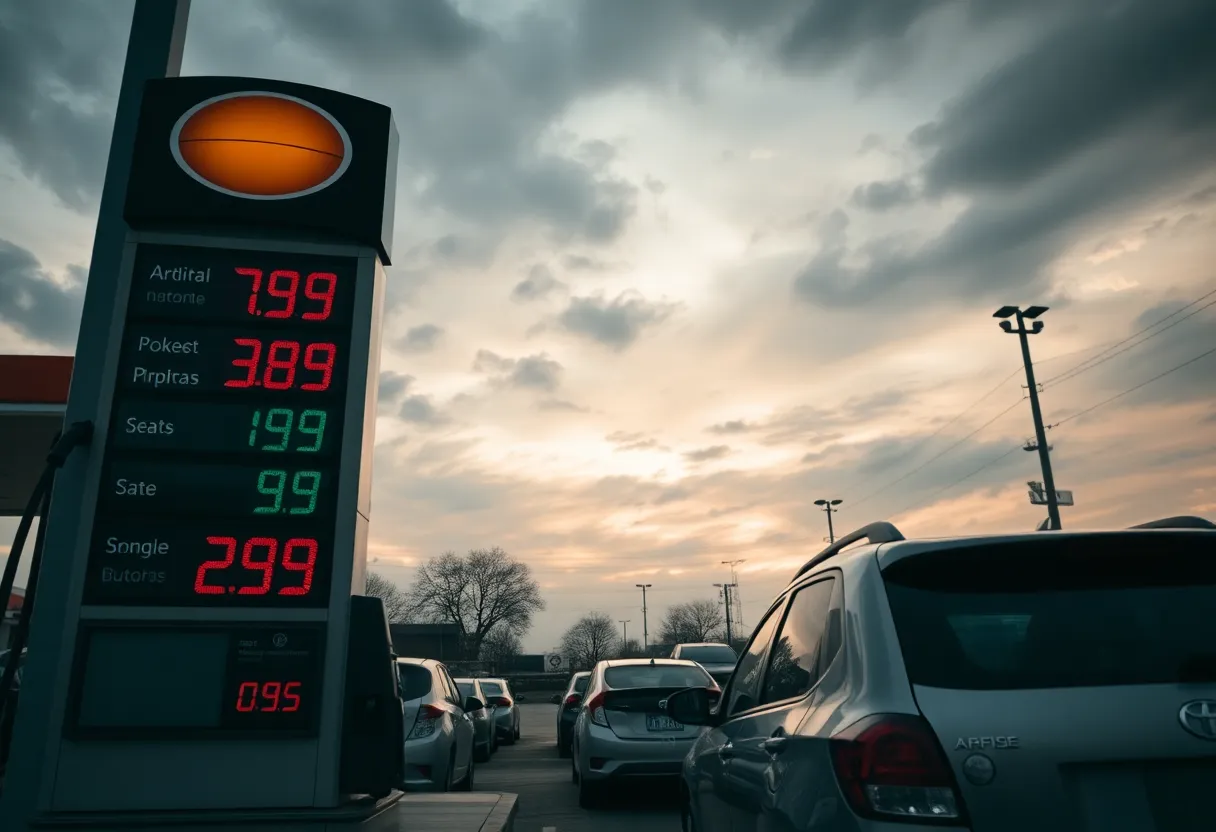News Summary
California is facing a significant increase in gas prices, potentially exceeding $8 per gallon by the end of 2026. This alarming forecast is due to refinery closures reducing capacity by 21%. With local consumption high and little in-state production, the state could be in for higher costs at the pump. Local gas station owners are already raising prices, and officials warn of economic impacts, including job losses. Consumers are urged to consider alternative transportation as the situation unfolds.
California is facing a projected increase in gas prices, with figures potentially exceeding $8 per gallon by the end of 2026, according to a recent report from the University of Southern California’s Marshall School of Business. This alarming forecast suggests that gas prices could rise by 75% from the current state average of $4.82 per gallon as of April 23, 2025.
The study conducted by Michael A. Mische estimates regular gasoline prices could fall between $7.35 and $8.43 per gallon, significantly affecting the budget of California’s residents. The projected increase is largely attributed to the impending closure of major refineries like Phillips 66 in Los Angeles and Valero in Benicia, which are expected to reduce California’s refining capacity by 21% over the next three years.
These refinery closures could eliminate between 6.6 million and 13.1 million gallons of gasoline per day from California’s fuel supply, a significant concern as the state consumes over 13.1 million gallons daily. Currently, California produces less than 24% of its crude oil needs and is heavily reliant on imports.
Mische emphasizes that there will not be a corresponding drop in fuel demand despite the reduction in supply, leading to a significant shortfall. Furthermore, California is experiencing a 20% reduction in its refinery production capacity, equivalent to more than half of Washington State’s total production capacity. This decline in refinery output is exacerbated by multiple factors, including increased state excise and sales taxes, costs related to the state’s cap-and-trade program, anticipated changes to the Low Carbon Fuel Standard (LCFS), and declining in-state oil production.
The LCFS changes alone could result in a 10% increase in prices, while additional expenses will reportedly stem from transportation needs as gasoline may need to be imported from locations as far away as the Gulf Coast or Asia. Mische cautions that vulnerabilities in the supply chain and potential geopolitical disruptions could further complicate the situation.
Local gas station owners are already starting to react to these trends. For instance, one station owner has reported raising prices from under $4 to $4.49 per gallon, although this remains below the state average. In response to these challenges, California Governor Gavin Newsom’s office has indicated plans to engage with refiners to ensure a reliable gasoline supply.
However, state officials, including Senate Minority Leader Brian W. Jones, are sounding alarms about an impending energy and economic crisis stemming from the refinery shutdowns. Urgent action is advocated as California faces rising costs at the pump and potential job losses; the projected closures are expected to eliminate about 1,300 direct jobs alongside approximately 3,000 indirect jobs.
Amid these uncertainties, more consumers are considering alternative transportation methods, including public transit, to cope with rising gas prices. Without regulatory changes or significant intervention, California gas prices may continue on a troubling upward trajectory, imposing greater economic burdens on residents.
The credibility of the report has faced scrutiny, particularly from the Governor’s office, which has questioned Mische’s neutrality alleging financial connections to foreign interests. Mische has denied these claims, stressing that his work on Saudi Arabia’s Vision 2030 was centered on reducing dependency on fossil fuels, not promoting petroleum reliance.
As the state prepares for a possible future of soaring gas prices, residents and officials alike are urged to consider the broader implications of these developments, both economically and socially.
Deeper Dive: News & Info About This Topic
- ABC7 News
- Wikipedia: Gasoline
- SFGATE
- Google Search: California gas prices
- KTLA News
- Google Scholar: California gas prices
- Forbes
- Encyclopedia Britannica: Gasoline
- CBS News
- Google News: California gas price news

Author: STAFF HERE COSTA MESA WRITER
The COSTA MESA STAFF WRITER represents the experienced team at HERECostaMesa.com, your go-to source for actionable local news and information in Costa Mesa, Orange County, and beyond. Specializing in "news you can use," we cover essential topics like product reviews for personal and business needs, local business directories, politics, real estate trends, neighborhood insights, and state news affecting the area—with deep expertise drawn from years of dedicated reporting and strong community input, including local press releases and business updates. We deliver top reporting on high-value events such as the OC Fair, Concerts in the Park, and Fish Fry. Our coverage extends to key organizations like the Costa Mesa Chamber of Commerce and Boys & Girls Clubs of Central Orange Coast, plus leading businesses in retail, fashion, and technology that power the local economy such as Vans, Experian, and South Coast Plaza. As part of the broader HERE network, including HEREAnaheim.com, HEREBeverlyHills.com, HERECoronado.com, HEREHollywood.com, HEREHuntingtonBeach.com, HERELongBeach.com, HERELosAngeles.com, HEREMissionViejo.com, HERESanDiego.com, and HERESantaAna.com, we provide comprehensive, credible insights into California's dynamic landscape.


